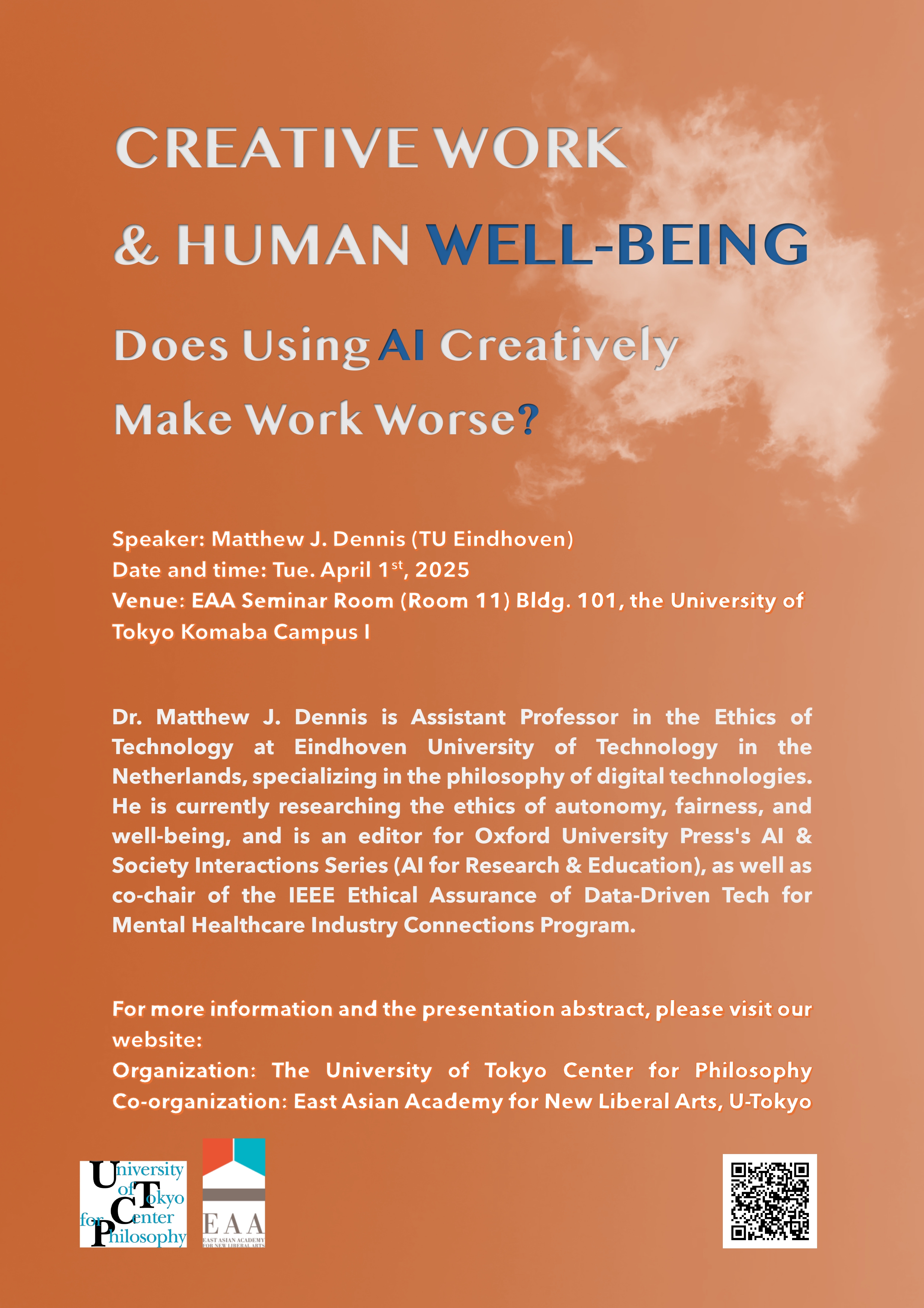
|
Title: | マシュー・J・デニス講演会「Creative Work and Human Well-Being: Does Using AI Creatively Make Work Worse?」 |
||
|---|---|---|---|---|
| Date: | 2025年4月1日火曜日 11:00-12:30 |
Place: | 東京大学駒場キャンパスI 101号館11号室(EAAセミナー室) |
|
マシュー・J・デニス講演会
"Creative Work and Human Well-Being: Does Using AI Creatively Make Work Worse?"
日時 : 2025年4月1日火曜日 11:00-12:30
場所 : 東京大学駒場キャンパスI 101号館11号室(EAAセミナー室)
言語 : 英語
興味のある方はお気軽にいらしてください。
要旨 :
Generative artificial intelligence (GenAI) is rapidly changing the creative industries and displacing the role of creative professionals. This has captured the attention of researchers from a wide range of disciplines, especially those investigating the future of creative work (Manovich 2024). GenAI can radically expand what creatives can do, speed up their activities, eliminate boring tasks, and make specialist skills otiose. Precisely because of the astonishing abilities of this technology, many creatives view it with a mix of alarm and scepticism because GenAI threatens to make the most distinctive part of their vocation redundant. These concerns are important. GenAI has only just started to change the creative industries, and the consequences of deploying it will fundamentally restructure creative work as we know it. Nevertheless, job and industry disruption are not the only reasons to be wary. Creative machines may adversely affect the well-being of creative professionals, as well as others who do creative work. This creates a new ethical challenge.
The connection between exercising one’s creativity and one’s well-being is often made in anecdotal contexts. Many creative activities (dancing, singing, life drawing, pottery classes) are explicitly promoted as ways to pursue self-care and enhance our well-being. There is empirical support for this link too. Recently, a comprehensive meta-analysis found a strong correlation of (r =.14) between well-being and what the authors call ‘everyday creativity’ (Acar et al. 2020). Furthermore, in many professions (not just creative ones), workers vociferously report that they value and enjoy the creative part of their job most (Deuze 2025). This requires us to ask: How does outsourcing our creative capacities to creative machines, such as GenAI, affect our well-being? What happens to our capacity to enjoy work when creative machines can perform many creative tasks better than we can ourselves?
This presentation will show how philosophical insights into how creativity and well-being are connected can illuminate the extent to which creative machines are useful for creative work. I will begin by examining the empirical literature that claims there is a robust connection between creativity, work, and well-being. I will then show that we can understand this connection in three ways, which map onto three distinctions in the philosophical literature about well-being (hedonist, desire satisfaction, objective list). My analysis will prepare for an extended discussion of the role of creative machines in working life, focusing on the creative tasks that GenAI cannot do. Finally, I will identify the ethical dangers of outsourcing creative tasks to GenAI by exploring Joanna Maciejewska’s viral slogan: ‘I want AI to do my laundry and dishes so I can do my art and writing. Not for AI to do my art and writing, so I can do my laundry and dishes’ (Maciejewska 2024). The slogan garnered 3.2M views on X, and resonated with creative professionals across the world.
REFERENCES
Deuze, M. (2025). Well-Being & Crea.ve Careers: What Makes You Happy Can Also Make You Sick.Intellect Books.
Manovich, L. (2024). ‘Separate and Reassemble: Generative AI Through the Lens of Art and Media Histories.’ Artificial Aesthetics. L. Manovich & E. Arielli. Online first.
Acar, S., Tadik, H., Myers, D., van der Sman, C., Uysal, R. (2020). ‘Creativity and Well-being: A Meta-Analysis.’ Journal of Creative Behaviour. 55 (3): 738–51.
主催 : 東京大学大学院総合文化研究科・教養学部附属共生のための国際哲学研究センター(UTCP)
共催 : 東京大学東アジア藝文書院(EAA)







